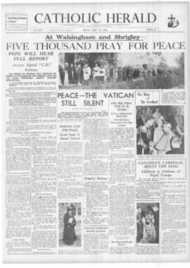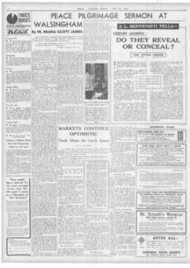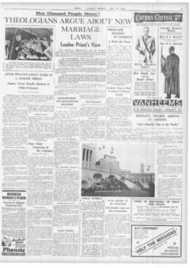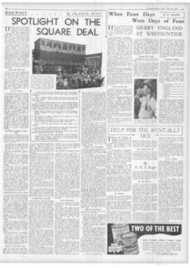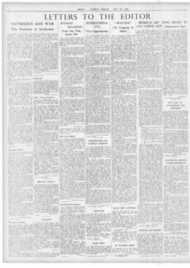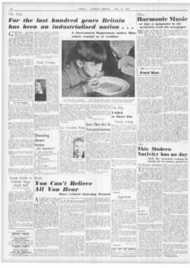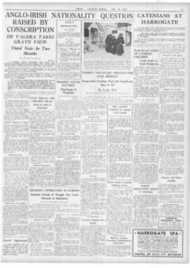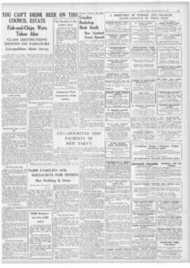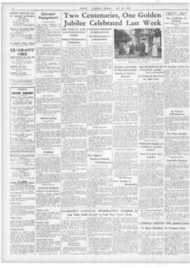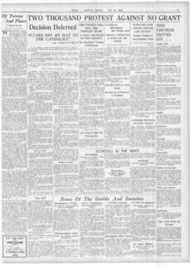Page 6, 26th May 1939
Page 6
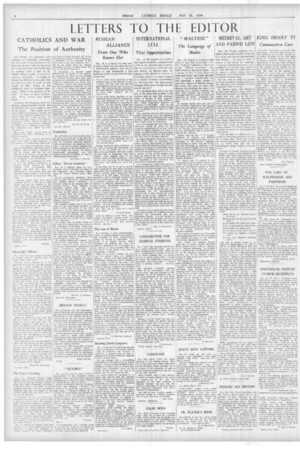
Report an error
Noticed an error on this page?If you've noticed an error in this article please click here to report it.
Tags
Share
Related articles
English Visitors' Impressions Of Malta
The Maltese Clergy Loyal To Britain
Malta's Independence?
Priests And The Language Of Malta
Are Maltese Clergy Pro Italian?
" MALTESE" The Language of Malta
Flugeja is certainly right when he says that according to the late Professor Tagliaferro there are in the " Maltese vernacular " over 8,000 words of neo-Latin origin. As a matter of fact, I think there are even many more ; one might also add, what I consider linguistically not less important, a great number of neo-Latin calques in Maltese idioms. But surely that does not mean that Maltese has forfeited the right to be
cultivated as a distinct language any more than English has becauee its vocabulary has been made up from most languages on earth. Linguistic, like racial, purity is not an indispensable asset.
Fr. Bugeja should have also told us that Professor Tagliaferro was himself one of the best Maltese writers, and that at the end of his scholarly essay, L'Elemento Nee) Latino nel Lessiro Maltese, he exhorted his fellow countrymen to cultivate the Maltese language which, in his own words, " et costituisce come entita etnografica nel centxo del Mediterraneo." Fr. Bugeja also writes that the advocates of pure Maltese (who are these, anyway?), dipping into one of the Semitic dictionaries, have produced a new dialect that is understood only by the " dippers."
Jointly with the Rev. P. P. Saydon, Professor of Hebrew and Biblical Greek, I have compiled the first literary anthology of the Maltese language, representing no fewer than 40 writers, and now prescribed as textbook in the higher schools of Malta. I am not aware that there is one single page in the whole work, and there are about 900 pages, of which Fr. Bugeja could say that it is intelligible only to such as dip into any Semitic dictionary.
Fr, Bugeja may be puzzled by the occasional revival of obsolete words and forms; but I am afraid he will have to allow for this literary luxury in which the writers of most countries cannot help indulging. Has not D'Annunzio revived any number of archaic words, and does not Papini still increase the stock of an already rich dictionary by coining new words? After all, the written or literary language is not anywhere exactly the same in all respects as the spoken one. But do we really want to exclude all the Itallanate words from the Maltese dictionary? May I, who have been one of the exponents of the movement for some years now, quote a paragraph on the subject from an article I contributed to United Empire of April, 1938? Here it is: " Of course, Maltese through centuries of cultural contact with Sicily, Italy, and Spain has assimilated many romance words, and the neo-Latin element is a very important feature of our language, but, as in the case of English that has assimilated new words from most languages on earth. it still retains both the grammatical structure and inflections which mark its origin. The unnecessary and arduous task of the purist would be almost as bad as that of the English purist who would exclude all the foreign elements from the English language."
Mr Anthony Cremona, one of the most outstanding exponents of the movement, has written an essay on the subject, denouncing exaggerated purism.
Mgr. Psajla, our greatest Maltese poet, also an Italian scholar, described by an Italian literary critic as " maestro di un Italian° puriesimo," is certainly not a purist of the neo-Pheenician type, to use Fr. Bugeja's expression, which reminds me of the hostile, abusive jargon of some of the Nationalist Party people in Malta.
Fr. Bugeja also quotes .the opinion of some philologists to prove that Maltese is a dialect. For our purpose the word " dialect," which indicates, after all, an inevitable stage through which all languages have had to pass at one time in the history of their evolution, has no significance at ail, and therefore it should not be allowed to obscure the main question at issue that to our people— the majority that is made up of the uneducated or insufficiently educated masses—Maltese is the only language they can speak and understand properly. Though Maltese was not cultivated for several centuries, it is still a pliable medium of literary expression.
Mgr. Psajla, for instance, has been able to translate Ugo Foscolo's famous poem. " I Sepolcri," and has himself written a longer poem, " The Ego and the Beyond." dealing with the difficult problem of the religious significance of human suffering. from the Christian point of view, which is something much better than the centuries-old but. fruitless criticism and disparagement.
Should Fr. Bugeja care to read or remember naragranh XI (first part) of Dante's " 11 Convito," written " a perpetual infamia e depressione delli malvagi uomini d'Italia che cornmendano lo Volgare altrui c lo proprio dipprezzano," I am inclined to think that he may agree that the contempt of some of our countrymen for their native tongue is, after all, nothing but a very old human weakness not yet completely killed out of our Islands.
.T. AQUILINA.
blog comments powered by Disqus


